March answered her phone, even though it was from an unknown caller. Maybe it would be her lucky day. Perhaps it would be someone asking to see one of the properties she’d listed in Bangkok. The woman on the other end of the line apologized. “You don’t know me, but are you the sister of Phisit Duangkaew?” Phisit, the brother she hadn’t seen for 30 years.
Tired of battling with his father, Phisit had run away from home at the age of 15. The family filed a missing person report a couple of days later. The police investigated to the best of their ability, but 30 years ago there were no computers or national databases around the world, much less in Thailand. Phisit went from missing person to presumed dead. Now March was hearing that not only was her brother alive, but he had been living with the same family for the past 30 years, in a town just outside of Bangkok.
Unfortunately, Phisit was quite ill. Hospitalized with a failing liver, he had been falling in and out of consciousness. In his delirium, his father had appeared to him. “Are you in pain?” his father asked. When he next opened his eyes, he told his adopted family that he wished to see his birth family one last time before he died. March rushed to his side the day after she received the shocking phone call. “Of course, I had my doubts. Maybe it was a scam of some kind. But when I walked into his room, he called me Ae, the nickname given to me by my family when I was a child. That’s when I knew he was truly my brother.”
March was torn about whether to tell the rest of the family. Her father had passed away some years ago, but her mother was alive. How would her mother handle learning that Phisit was alive, only to lose him all over again to a terminal illness? Phisit decided the issue for her. “Ae, after my cremation, I want my ashes to be taken back home to Nan. Will you do that for me?” The next day, March set up a video call so that Phisit could see his mother and brother. He died the following day at 4 p.m.
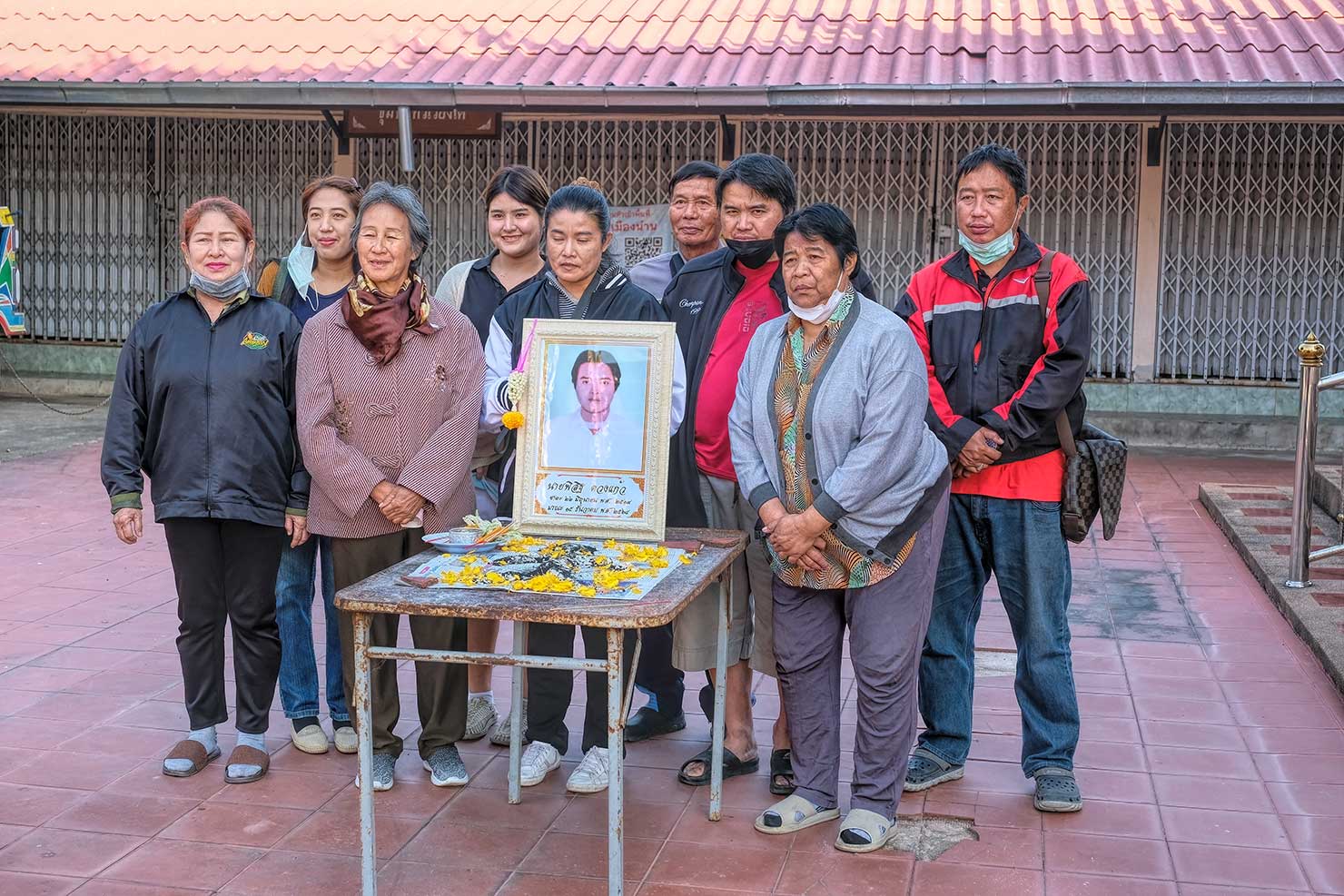
I heard the story from March as we drove to Nan Province several days later. She’d planned the trip some weeks earlier and had invited me and two other friends to tag along. But that day, there were actually five of us in the car. As she drove, March cradled a small urn containing the ashes of Phisit in her lap. “He slept next to me last night,” she said. She would not allow him to be alone for one moment during the journey back home. March explained that the family had arranged for a Buddhist funeral at Wat Hua Weang in Nan City the following day to honor Phisit. After prayers chanted by monks, his ashes and bone fragments would be poured onto a table, where they would be formed into the shape of a man. Following more prayers and photos of the family around the table, the cremains would be set off like fireworks, sending them high into the sky.
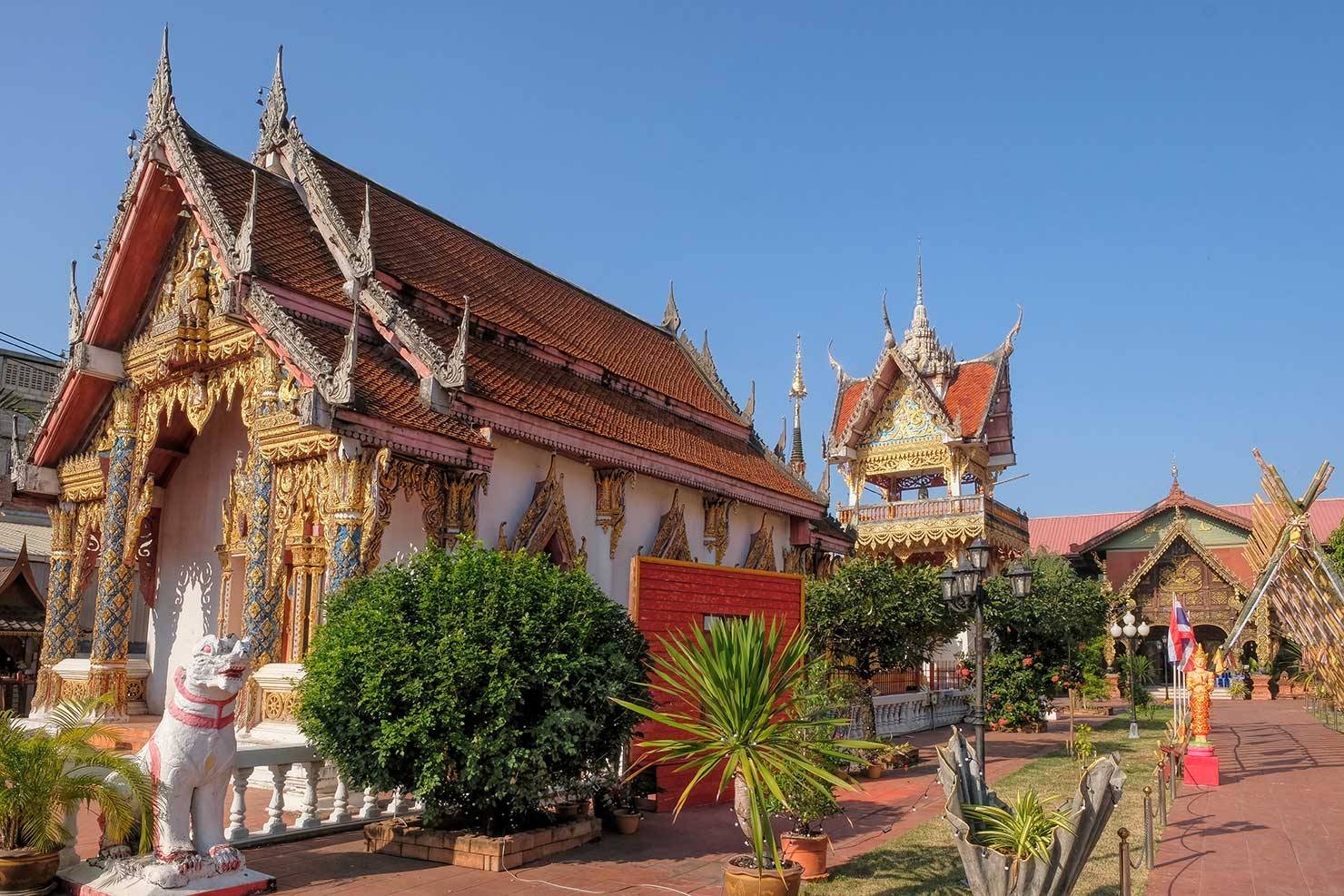
I was fascinated by the ritual she described. I had attended a funeral ceremony for relatives of my adopted family in Nepal. But I’d never heard of cremains being shot into the air. Apparently it is a tradition practiced only in the north of Thailand, in provinces that were originally part of the Lanna Kingdom. I asked if the family would allow me to attend. This is not as unusual as it sounds. Nor, as many will certainly criticize me, was it disrespectful. In Asia, the subject of death is not taboo. Perhaps due to Buddhist belief in rebirth, death ceremonies are more of a celebration of life than in western society. Birth and death are regarded as a continuation of a cycle, and happiness and sorrow are considered the same thing. Everyone is welcome at a Buddhist funeral, and taking photos is not only considered acceptable but expected.
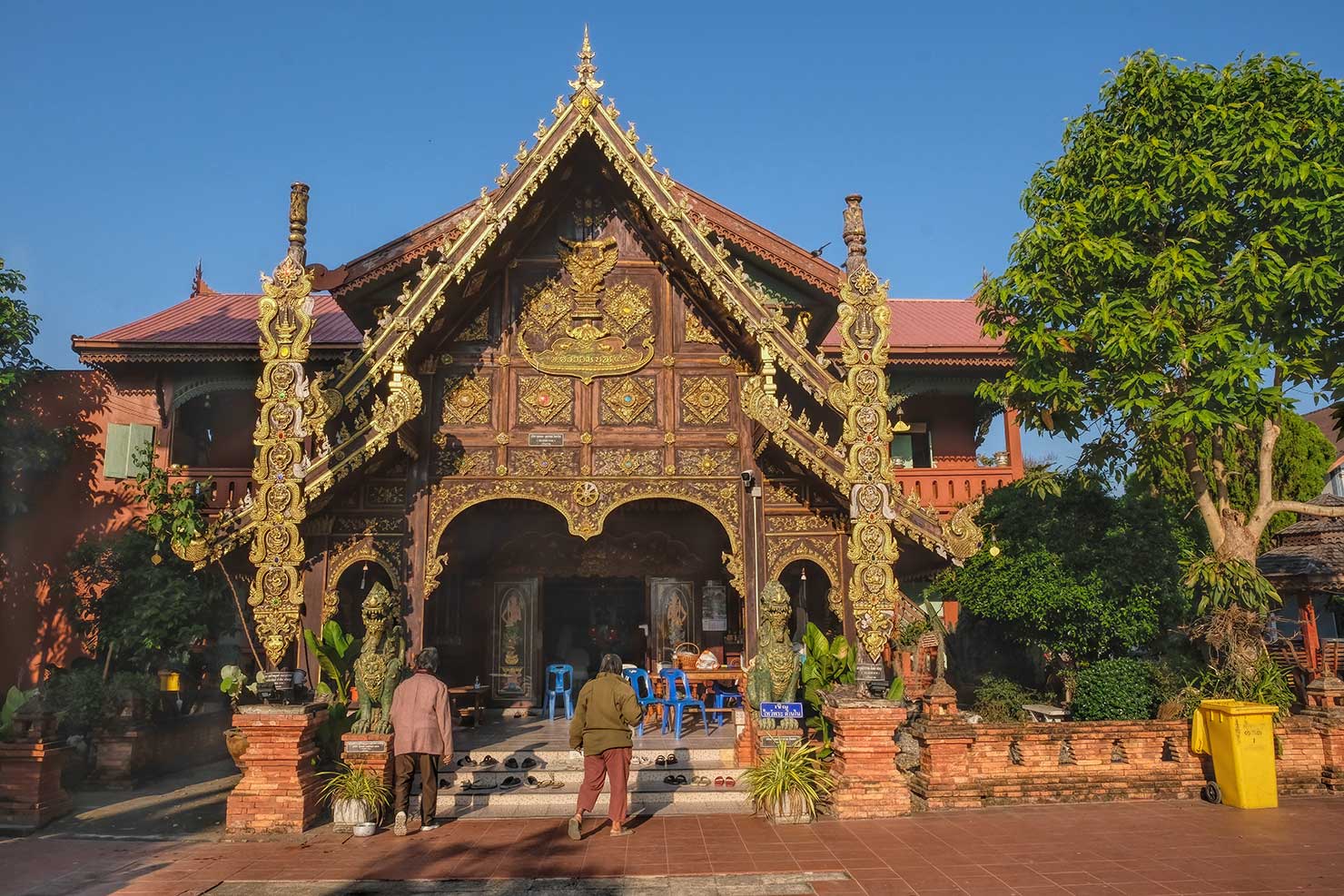
The following morning I sat with my palms pressed together in front of my chest as the monks chanted the death sutra to benefit the deceased. At the end of prayers, I waited respectfully as each attendee knelt in front of the head monk, who tied a length of red yarn around each person’s wrist as he muttered a blessing. As the last person backed out of the room, my friends and I rose to leave, but the monk called us back. We too received red yarn bracelets as a blessing.
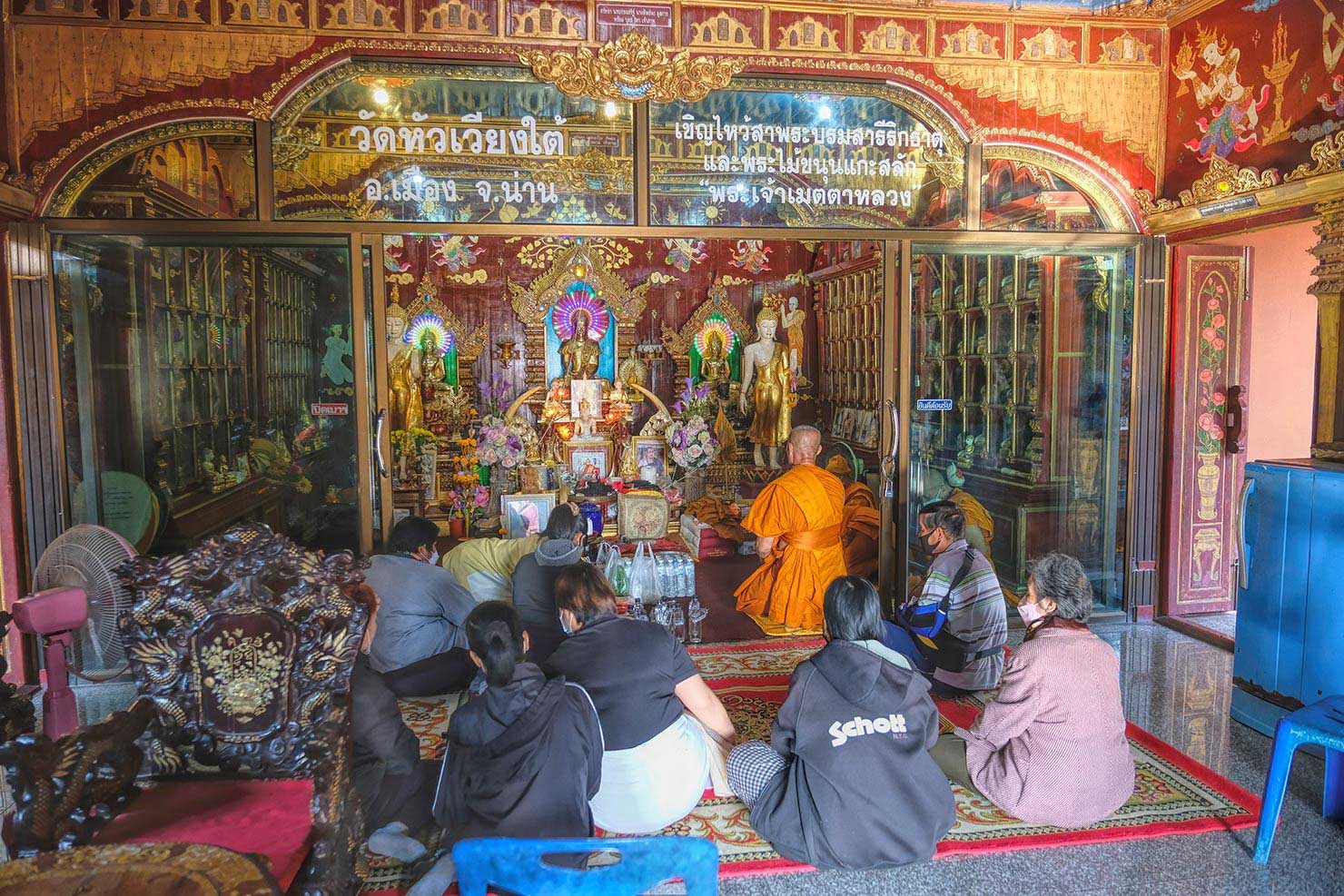
Just outside the Wat, monks had fashioned a crude figure of a human from Phisit’s ashes and bones on a newspaper-covered table. The family gathered around the table to sprinkle flower petals on the ashes and take final photographs. The ceremony complete, an older monk who had been pacing back and forth on the edges of the open space lowered a long bamboo pole down to the ashes. A smoking stick of incense tied to the top of the bamboo pole touched the human form. Crackle-bam! The pile went up in smoke, forming a mushroom-shaped cloud as it ascended to heaven.
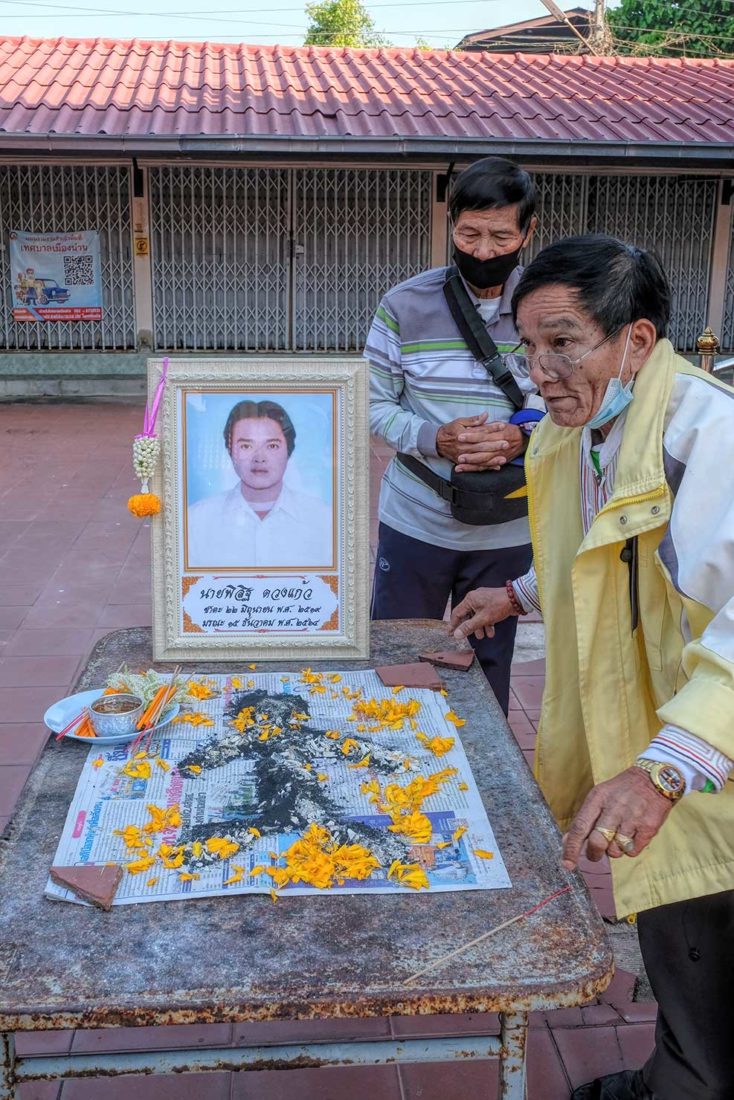
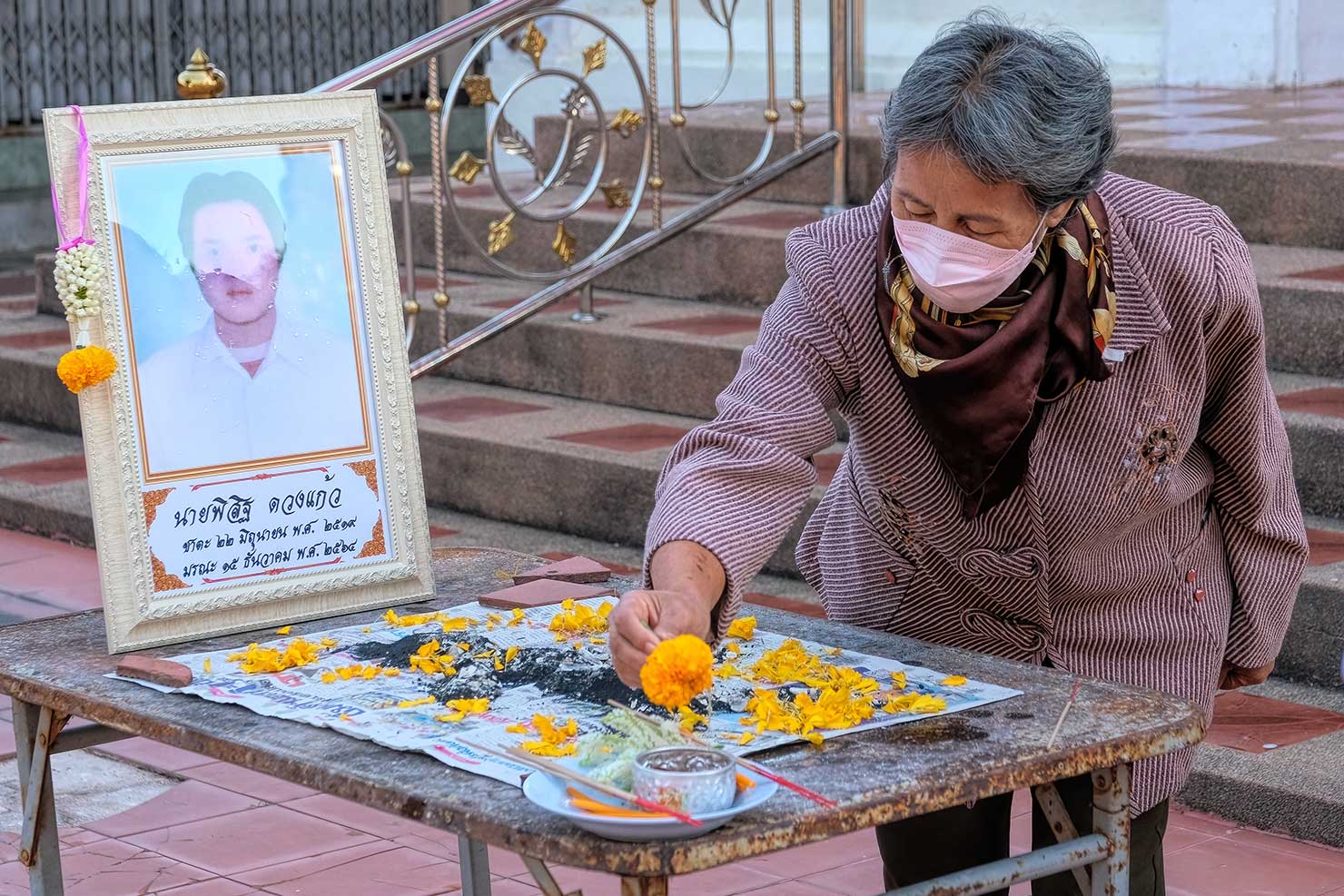
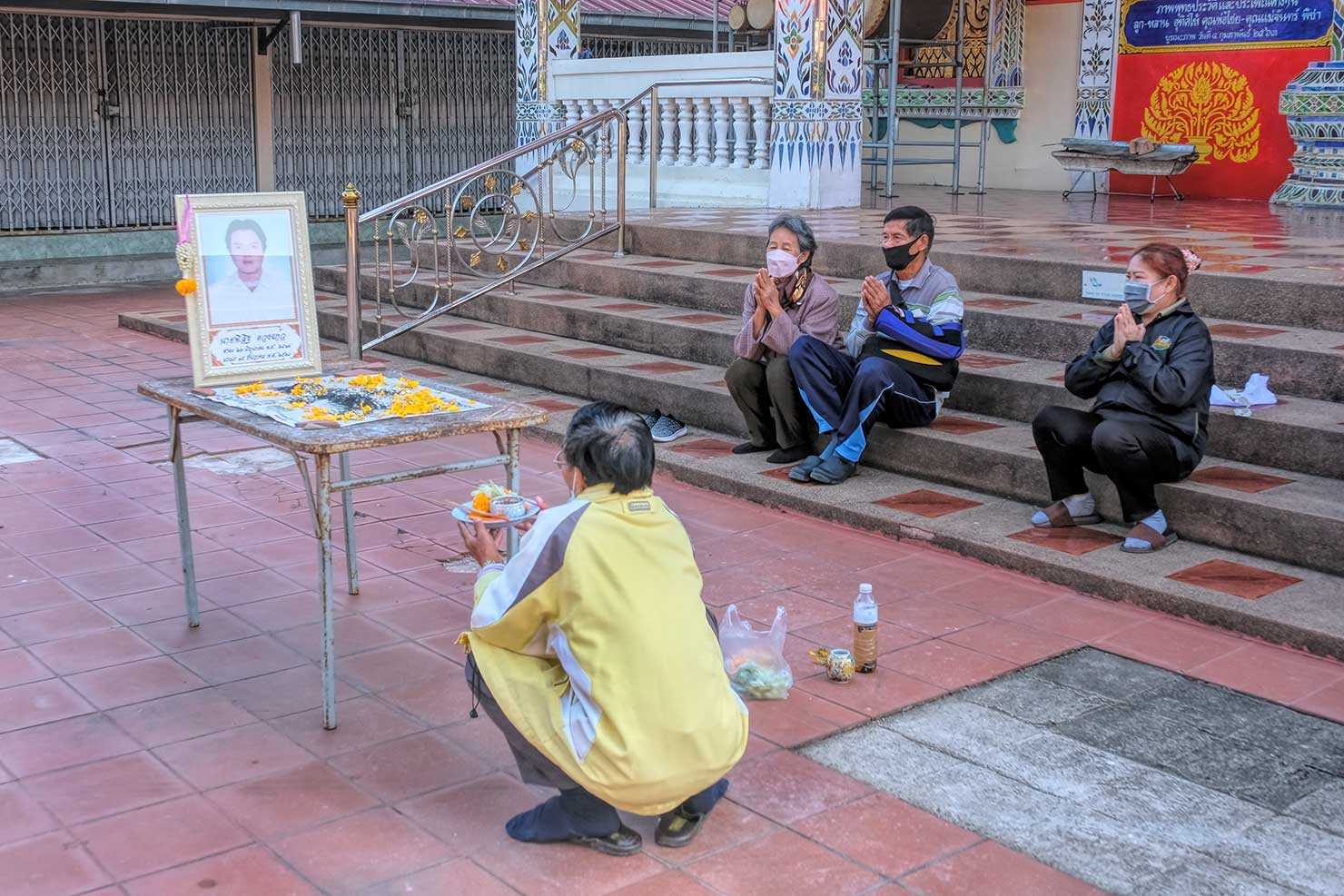
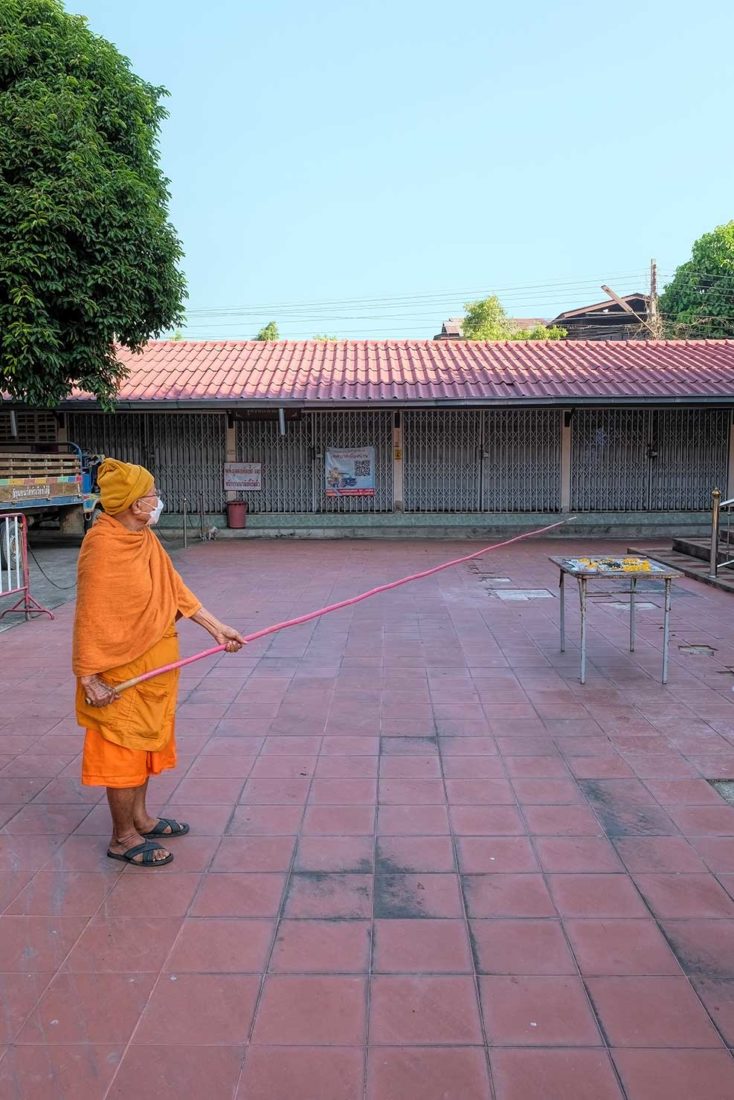
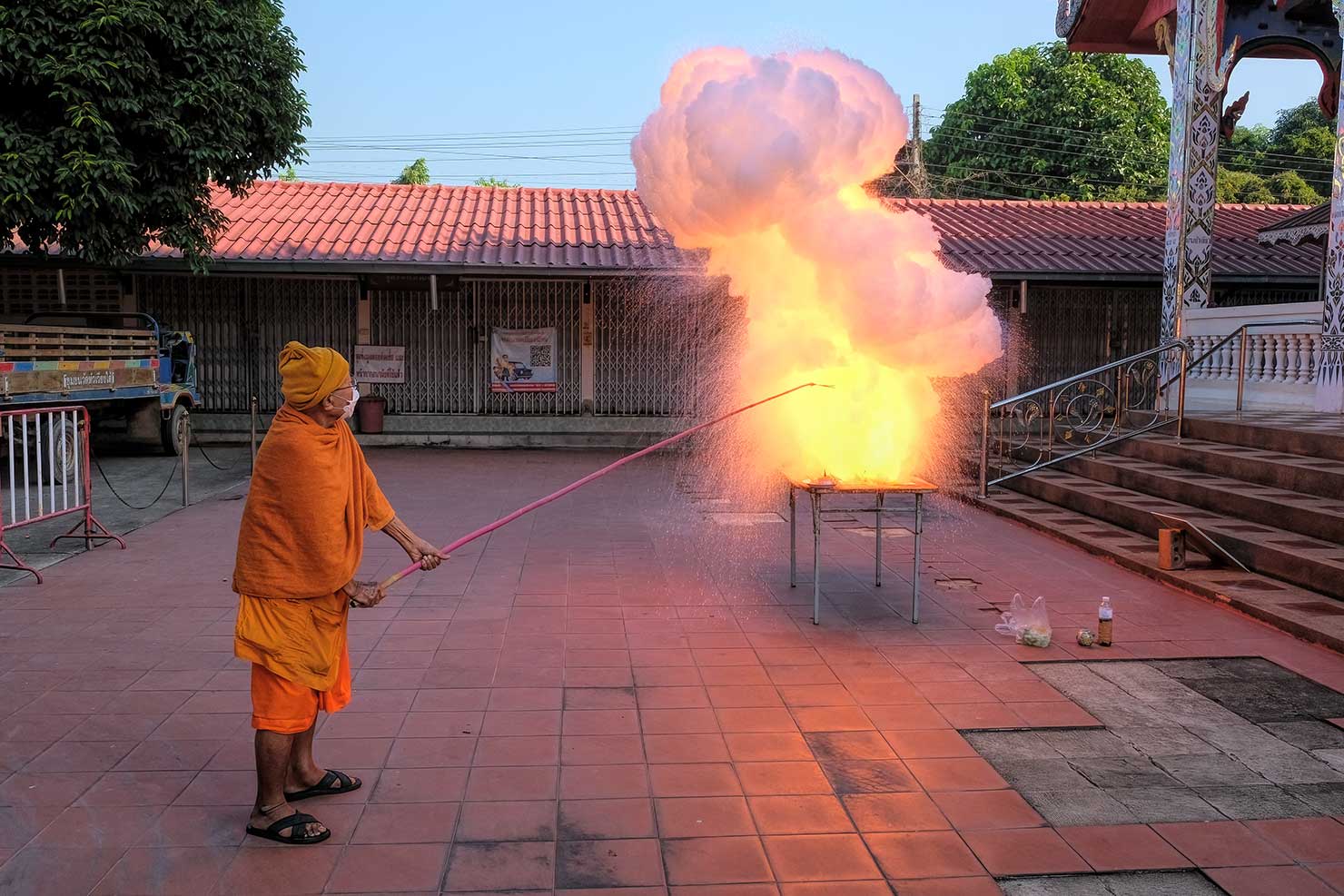
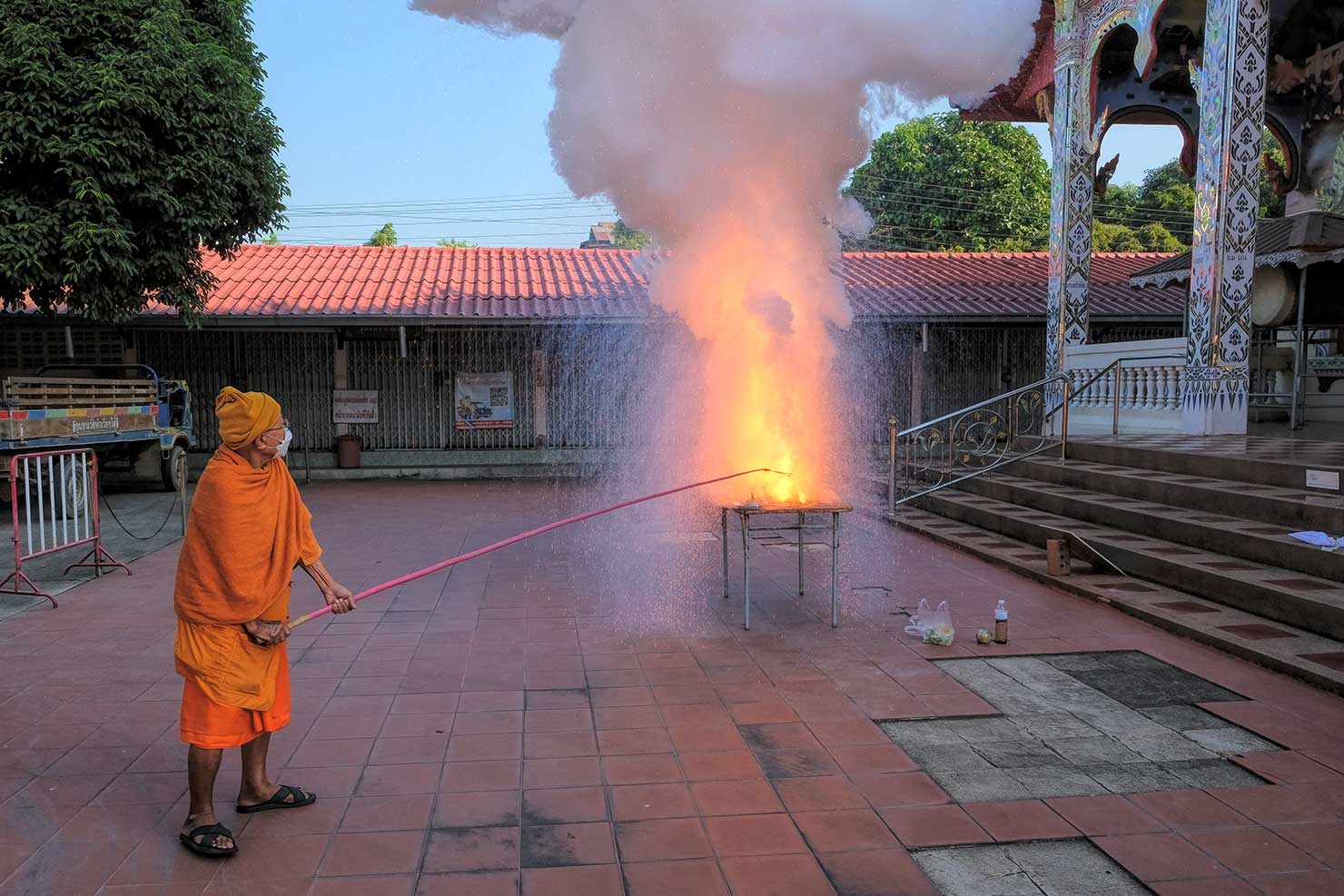
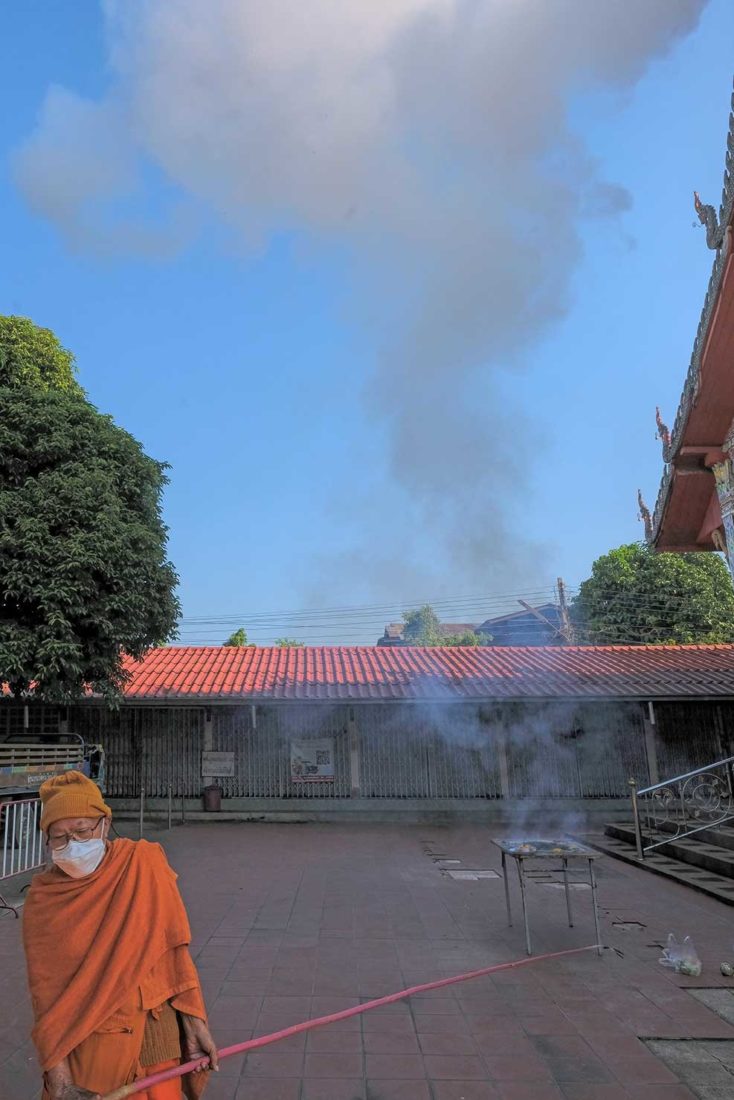
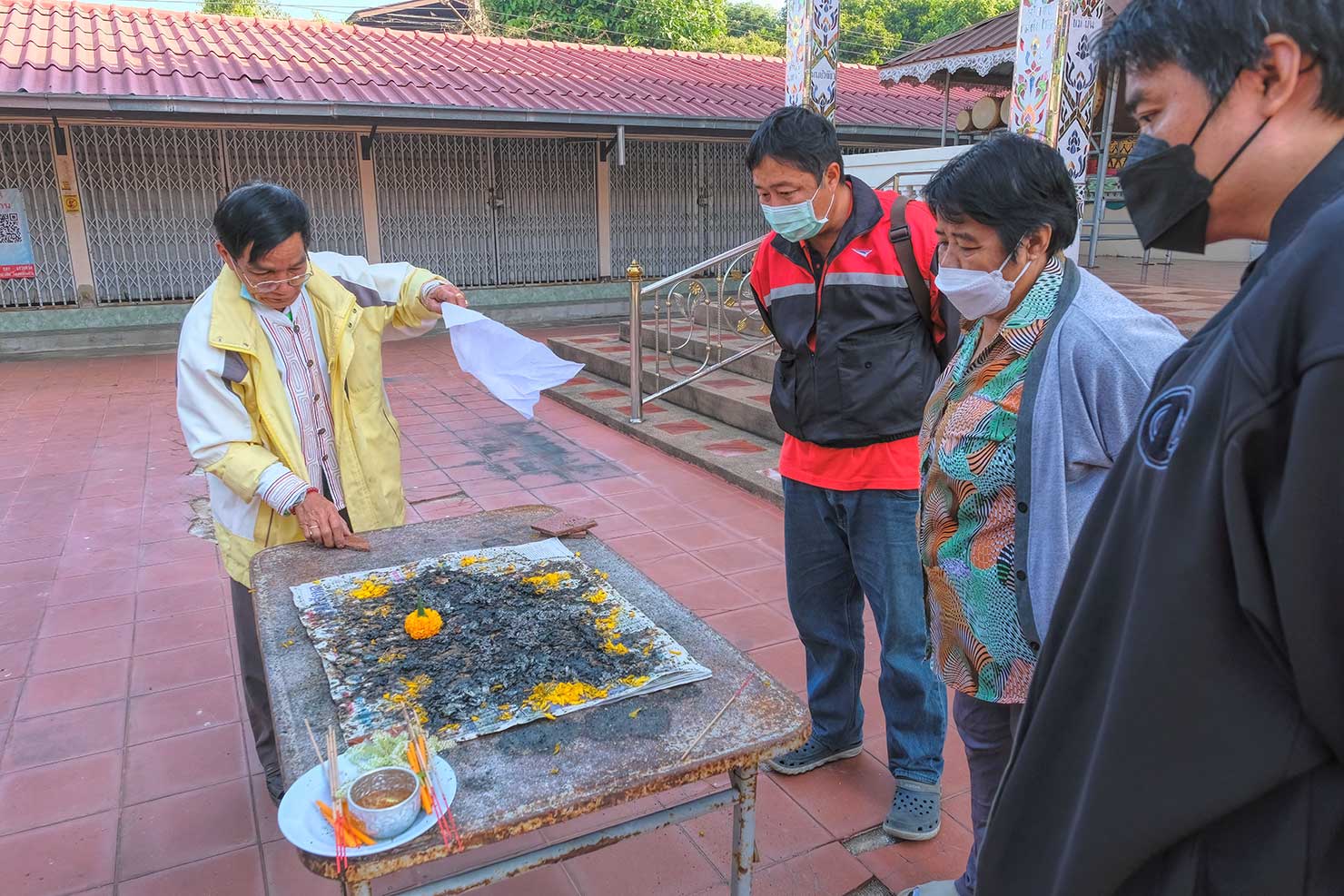
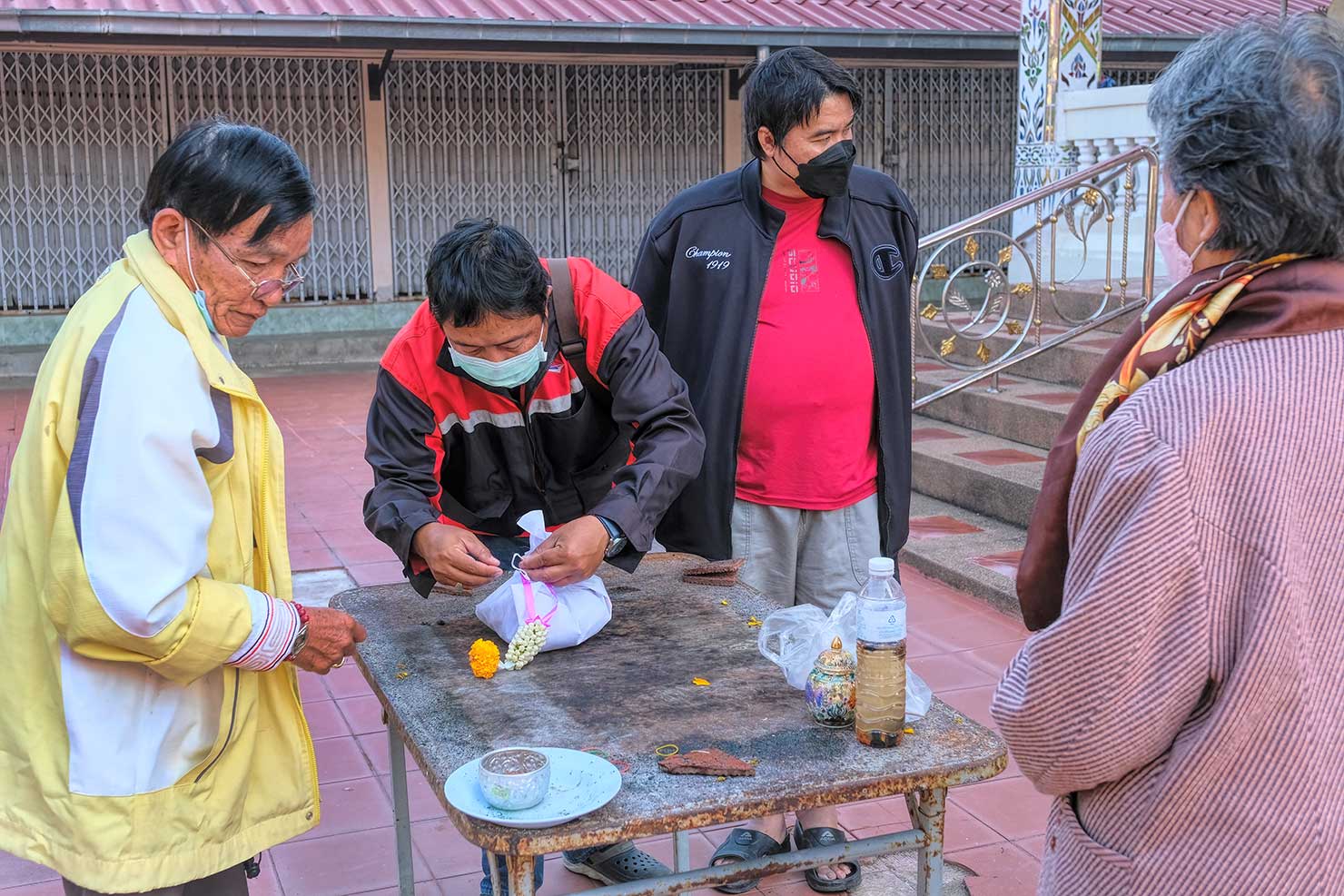
When the smoke cleared, all that remained was a gooey black residue. It was folded up in the newspaper, lovingly wrapped in a piece of white linen that was tied with string, and topped with a flower. The immediate family drove to a nearby river and set it afloat, watching respectfully as it sank beneath the surface. I was entranced. I cannot imagine a better way to end a life and I made my friends promise that this would be my fate as well. I want to go out with a bang and have my molecules carried around the globe by gentle winds for all eternity.

Your blog post ‘I Want to Go Out With a Bang…Literally’ is thought-provoking and boldly explores a unique perspective on life’s end, sparking introspection and discussion.
Thank you Harshita.
Thank you for sharing your travel tips and recommendations, they will definitely come in handy for my future trips. Keep up the great work and I look forward to reading more of your adventures!”
Hi Barbara! I just found your site and very much enjoyed your article on the Northern Thai funeral ceremony. Like so much that we experience in our journeys, it ran the gamut of emotions and I was very happy that the family was able to reunite before it was too late and then to celebrate Phisit’s life and death in a way that was meaningful to them. It is SO interesting to observe the beautiful customs of other parts of the world and I agree that our Western culture can learn much from the East about many aspects of life as well as death. This story especially touched my heart as my husband died in March and next month we will scatter his ashes in a beautiful memorial forest and then have a party to celebrate the life of a wonderful man. While it will not involve pyrotechnics, it is a departure from what our family typically does and I am hoping that the memorial gatherings will bring comfort to all our our loved ones. Kudos to you on your solo traveling, your open spirit of adventure, and on ultimately finding a wonderful home that suits you to enjoy what I hope will be many, many more years. We should all be so lucky! I will be interested to read your past articles and any others that you post in the future.
Hello Gret: Thank you very much for your lovely comment. I also am fascinated by customs in different cultures. I have been living in the East for a while now, so I don’t much resonate with Western views any more. I was so pleased to read that you enjoyed my article, and about how you plan to celebrate your husband’s life. I am sorry for your loss, but perhaps you can take comfort in knowing that you will be releasing him from this earthly plane when you scatter his ashes.
From Barbara Weibel Mihalas,
It is several years (too many) since we have corresponded. We are connected by name, as my pre-marriage name was Barbara Weibel, and I continue to treasure it.
I got very busy raising twin grandsons, who are now 14, but have always had you present in the inner reaches of my mind.
I hope you get this note, and I double hope you will send a note back.
My email address, if it’s useful to you, is [email protected]. The “Weibel” is hidden in the middle.
I have continued to think of you often, and am amazed that so much time has flown by since we last corresponded.
What a lovely, well-written story! This is such a beautiful concept, one I think I would appreciate knowing was my final ending as well. Thanks for sharing!
You’re welcome Tammy. I’m glad someone other than me sees the beauty in this ceremony.
Your articles are always so interesting and insightful, Barbara. Thank you for sharing this funeral custom.
Hi Anukrati. Thank you for the lovely compliment. I’m fascinated by culture and love hearing that others find it as interesting as I do.
Such a great idea about the Buddhist funeral with a bang thanks sharing this article
Thanks for your comment. Glad you enjoyed it.
Very interesting read. Thank you for sharing this custom.
You’re so welcome Joan. Pleased you enjoyed it.
Wow, what a way to go! Thank you for sharing what you learned about a funeral in Northern Thailand. Funerals are meant to be happy occasions and something we can learn from your story.
I completely agree Betty. In fact, here in Thailand it is considered a taboo to cry at a funeral. The tears are said to unsettle the departed, keeping him or her from departing the earthly plane.
Thanks for sharing such an incredible story, truly amazing.
Thanks Mike!
As always Barbara you write an explain so wonderfully that I feel i am there with you. Great to know that you are still in Thailand. Reschedule again this time hopefully will get there in May 2024 for a minimum one month. Thank you for all that you do!
Hi Rene: Long time no hear from you! I’m sure I’ll still be here in 2024, so I’ll look forward to meeting you in person.
Fantastic article, Barbara…and very interesting. A travel article of a different kind…one that transcends all others! It’s ironic that you posted this today, as just yesterday I read this article and thought of you when you visited Tibet….and their death customs. The western world needs to change their thinking on this, and choose a greener way to die! I’ve attached it for you….https://getpocket.com/read/3530464257
Hi Crystal. So pleased you enjoyed it. I get so tired of reading articles about the “top ten places to visit” that I always try to bring my readers something different. I’ve long been a believer that the way Westerners approach death is all wrong. Easterners have a much healthier attitude toward death.
A lovely story, beautifully told. You and your friends were so privileged to be able to be part of this transition and celebration. What caused the ashes to explode into fireworks? Was there something special with the incense stick?
Hi Liz: You know, I don;t have an answer to that. I wondered at the time but forgot to ask, and when I later asked my friend she didn’t know either. I’m assuming they mixed gunpowder with the cremains. Considering the distance the monk with the bamboo pole kept from the ashes, that seems like a pretty safe assumption.
That was interesting. Thank you for sharing, Barb..
Of course Helen…so pleased you found it interesting.
Fascinating story, Barbara. Thank you so much!!
You’re very welcome Jelan. Glad you enjoyed it.
Such a beautifully delivered and instructive story! Thank you.
Thank you very much Charlotte. I’m so pleased you enjoyed my story.
An interesting ceremony. Thanks for sharing . A very unique way of celebrating a person’s life. And wow ! To go out with a bang – amazing!
I thought so too Irene! We should all go out this way 🙂
What an incredible scene. Thank you for sharing your writings; you’re an inspiration.
Thanks Sandi. I don’t publish a lot of stories these days because my travels have been quite limited for the past two years. So I love hearing thatmy followers still find what I do publish interesting.
This touched my heart and soul Barb.
Thank you so much Colleen! It’s always wonderful to hear from you. Hope all is well on the Outer Banks.
This was fascinating – I’ve never heard of a funeral like this before. And what a lovely, albeit sad, story too, that the family got to speak to their brother/son once last time and to hold a funeral for him after thinking he’d died 30 years ago.
Hi Anne: Yes, I felt the same way. Bittersweet for sure. I also had never heard of this practice at a funeral, although since I published the article I’ve been told that sometimes they even fire the remains out of a cannon. I never stop learning new things about Thai culture.
Even though many Thai folk grieve because they are not enlightened (like most of us), many have a good idea that death is but a door, a part of life and actually, impossible. The body that dies is not real. The soul that lives forever, is real. Why not celebrate our next journey? The body really is a puppet, animated by an unlimited mind that is ultimately an infinite soul. Nothing scary about these truths! Cool post Barb. Hope all is well over there.
Ryan
Thanks so much Ryan. Glad you enjoyed it. Thai culture continues to fascinate me. All is well here, though I’m having attacks of itchy travel feet.